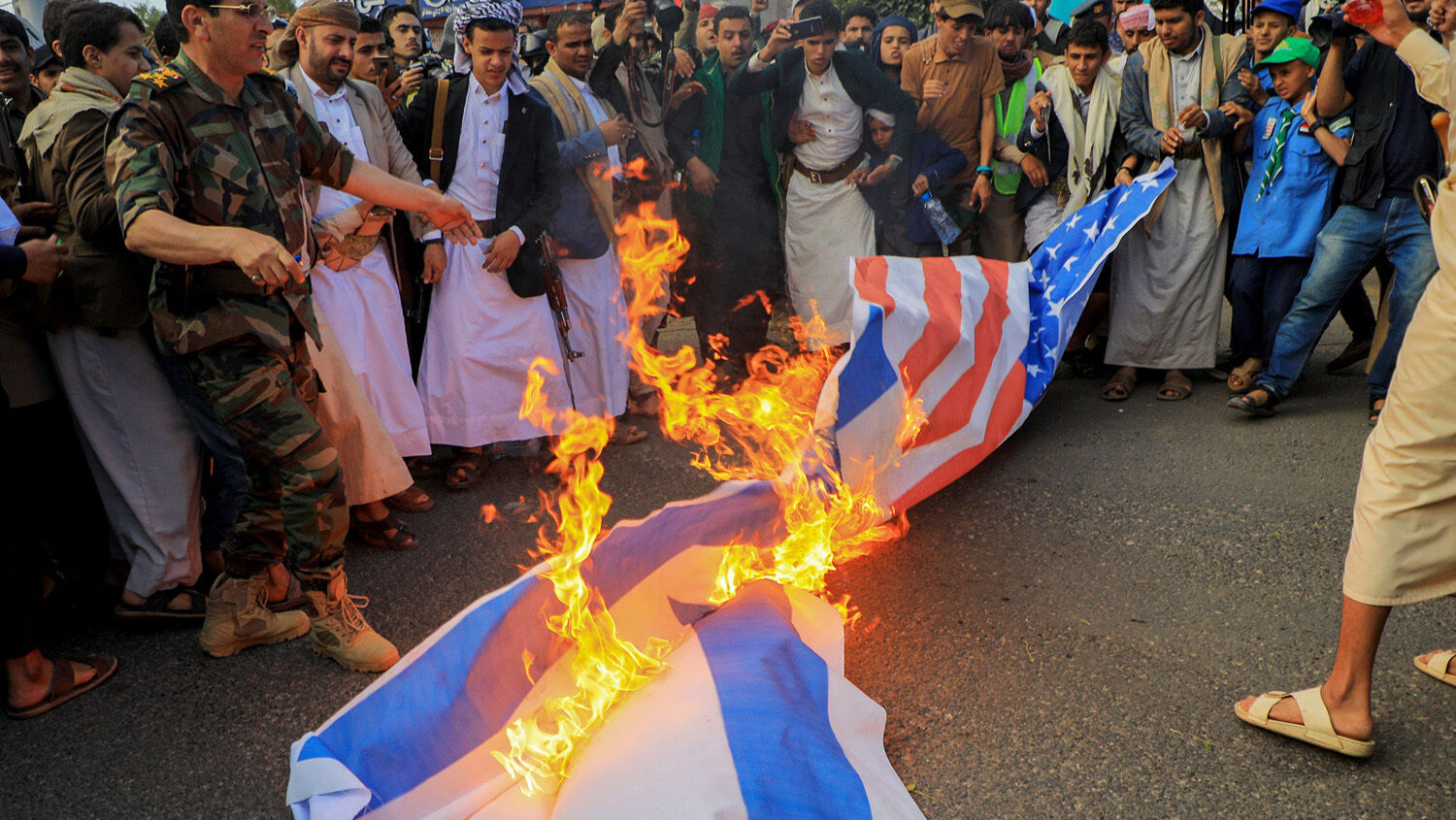
Houthis Declare War on Israel
Israel’s main enemy in the current war is Hamas. But Hamas isn’t Israel’s only foe in the conflict. It’s not even the most formidable. This video is from a Hamas military parade in Gaza two years ago:
Compare that with the following video from last year.
This military parade took place last year in Al-Hudaydah, a city on Yemen’s Red Sea coast. The organizers were the Houthis, an Iran-backed Shiite terror group that controls much of eastern Yemen, including Sanaa, the capital. The Houthis’ goal is to turn Yemen into a Shiite Islamist theocracy, like their Iranian sponsor.
Compared to Hamas, the Houthis have a much bigger terrorist toy box to play with. And they declared war on Israel on October 31.
Technically, they declared war on October 19. That was the day the uss Carney, an American destroyer in the northern Red Sea, intercepted three cruise missiles launched from Yemen in the direction of Israel.
On October 27, a drone from Yemen hit Taba, Egypt, a town on the Israeli border, injuring six people. Egypt shot down a second drone, the debris of which fell near the town of Nuweiba. The Houthis didn’t immediately claim responsibility for either assault.
This changed on October 31. Houthi spokesman Yahya Saree stated they “launched a barrage of ballistic and cruise missiles and numerous drones on various Israeli positions in the occupied territories.” Saree confirmed this latest barrage was the third the Houthis have launched, meaning they now acknowledge the previous two attacks.
https://twitter.com/buddy_shahrukh/status/1719588412020375711
Israel said its air force and missile defense systems downed two salvos approaching the Red Sea city of Eilat, Israel. This included a missile that approached Israel on the evening of October 31, possibly a fourth attack separate from the one earlier that day. The Israeli Navy also mobilized in the Red Sea.
Saree promised this wouldn’t be the last Israel sees of the Houthis. On November 1, the Houthis released a video threatening to attack Israel with drones.
The Houthis have a formidable military. Their cruise and ballistic missiles can travel over 1,000 miles. They also have a large arsenal of drones, including Shahed-136 “suicide drones,” infamously used by Russia against Ukraine. The Houthis have what some consider “the most sophisticated arsenal of ballistic missiles and drones among Iran’s regional allies and proxies,” according to an October 25 article on Semafor. Some analysts estimate the Houthis at one point had over 100,000 fighters and followers.
Does this mean we can expect 100,000 battle-hardened jihadis to start pouring into Israel? No. Yemen is far away from Israel, and the Houthis would have to go through or around Saudi Arabia and Egypt—two Israeli partners. The Houthis have launched drone attacks against Saudi Arabia and the United Arab Emirates. But aside from its unmanned weapons, the Houthis are in no condition to support conflicts on the other side of the Middle East. Doing so would jeopardize their own position in Yemen.
But that doesn’t mean the Houthis couldn’t become a significant factor in the war. Fabian Hinz, research fellow at the International Institute for Strategic Studies, told Amwaj Media on November 1:
From a political and strategic point of view, Yemen is a fantastic launchpad for Israel’s foes. This is because there is no risk of a cataclysmic war resulting from the launch of a major strike, as is the case in Lebanon. There is neither a delicate domestic balance that may be disturbed, as in Iraq. If the Houthis fire drones or missiles, and if the Israelis or Americans respond with air strikes, would the Houthis or Iranians actually care? Not really. They are simply used to it, as horrible as it sounds.
The Houthis’ control of the Red Sea coastline also puts them in a prime position to disrupt global shipping. As a result, the Houthis (with Iranian backing) have obtained a large stockpile of antiship missiles and mines.
The unknown factor is how Saudi Arabia will respond. The Saudis have fought the Houthis for years in support of Yemen’s internationally recognized government. Tired of Houthi missiles hitting his people and the bad press he’s received from the West, Saudi Crown Prince Mohammed bin Salman started peace talks with the Houthis in April.
Bloomberg reported that Saudi Arabia shot down one of the missiles headed toward Israel on October 30. It also reported the Houthis had a skirmish with the Saudi military last week in the southern Jazan province. Four Saudi soldiers died, the first time Saudis have died fighting Houthis since April.
Could the Israel-Hamas war restart the Saudi-Houthi war? It’s too early to tell. But one thing is certain: Despite its distance from Israel, Yemen is a region to watch in this conflict.
The Trumpet expects the situation in Yemen to become more impactful—not only in the Middle East but in the wider world. The Houthis’ involvement in Hamas’s war may be a harbinger of this.
To learn why this is important, read Trumpet editor in chief Gerald Flurry’s April 2015 article “Iran Gets a Stranglehold on the Middle East.”
